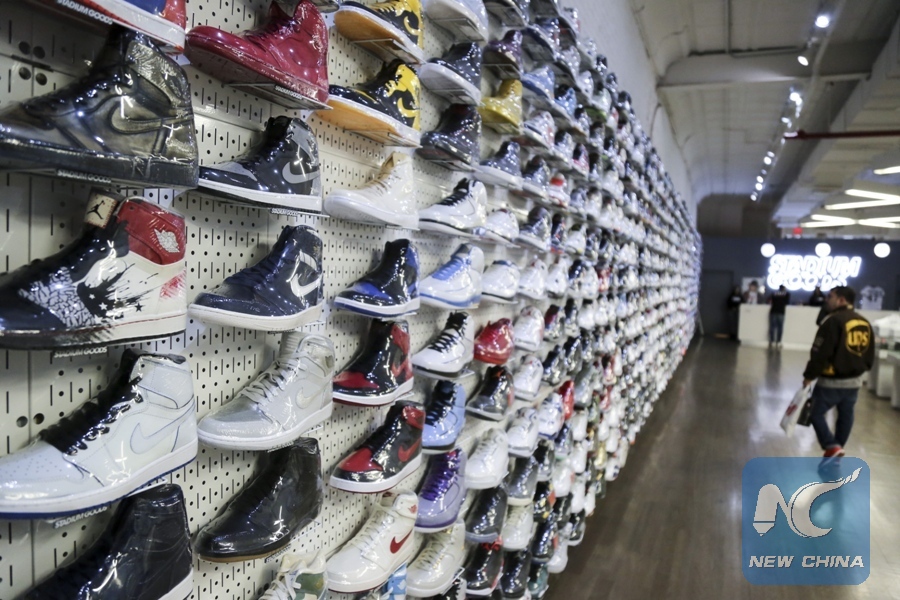
File Photo: A customer looks around at a store of Stadium Goods in New York, the United States, on Nov. 8, 2017. Stadium Goods is a New York City-based marketplace that sells the most sought after footwear, apparel and other hard-to-find items on behalf of their owners both online and in its retail store. In August 2016, the company opened a store on Tmall, China's largest B2C online platform, and has since seen fast market expansion. (Xinhua/Wang Ying)
by Peter Mertz
DENVER, the United States, Oct. 3 (Xinhua) -- American sports industry heavyweights met last week at the historic Brown Palace Hotel in downtown Denver to discuss retail opportunities for the future.
One of the hot topics was boosting trade with the biggest sports market and most populous country worldwide. China's emerging middle-class, hungry for high-quality products, is the most desired market in the world, American sports brand marketers told Xinhua.
"There's a lot of momentum already building between the USA and China in sports," Sports and Fitness Industry Association (SFIA) president and CEO Tom Cove said.
Founded in 1906, SFIA is considered America's voice to more than 1,000 sporting goods and fitness brands, manufacturers, retailers and marketers in the over 150-billion-U.S. dollar sporting sector.
"The one thing I can say with a high degree of confidence is that China has the right kind of talent to be as influential in sports and the sporting industry as it has been in software and artificial intelligence," said convention speaker David Schrage, a research fellow with Massachusetts Institute of Technology (MIT).
"There are opportunities for the fusion of Chinese technology and American technology (in sports-related fields)," Schrage added.
Schrage said China's "infrastructure" of sports marketing vehicles, including platforms such as WeChat, Alibaba, Tencent and even videos and "selfies," all contribute to a market ripe for sports marketing.
"I think this is going to be most interesting," the MIT expert told Xinhua, saying China's vast Internet involvement "really gives ... China an edge in terms of creating communities of sporting interest."
Retail sales in China are expected to equal or surpass those in the United States for the first time this year, indicating China's rise to an economic powerhouse, according to a 2018 Washington Post article.
Cove believed that the Chinese, like the Americans, want to be healthy and with increasing buying power, Chinese citizens are open to the "benefits of healthy living."
He travels to China frequently, and gives speeches at Chinese sports conventions on how to promote sports both through consumer activism and product development and sales.
According to online statistics database Statista, the global sports apparel market was estimated to generate about 174 billion dollars in revenue this year, and that, said industry insiders, is just the tip of the iceberg.
U.S. consumer technology broke another record in retail sales this year with 351 billion dollars, according to a new research from the Consumer Technology Association (CTA).
"We can share ideas about how to grow the benefits to the people that actually play and create and compete," Cove said.
No country has prioritized or invested in sports as China has done in recent years, especially in skiing and soccer, he added.
Cove said the biggest common challenge to both Chinese and American sports leaders now is to attract younger participants.
In fact, since the new millennium, China has made rapid progress in global sports at a rate which almost parallels that of its economy and is expected to surpass the United States by 2024.
"Sports is the big connector," said Cove, who believes that it is historically an opportunity for people to set aside differences and cooperate in the arena of structured, rule-governed sport.
"With 1.4 billion people, China will soon dominate the Olympic Games, as no country has ever done," Denver businessman and China expert James Ryder told Xinhua.
As a successful businessman and investor, Ryder was quick to connect the dots between sports and money.
"It is a wide-open market, and an amazing opportunity for financial success for a younger, intelligent entrepreneur," he said.
"We have a very positive relationship in terms of our brands -- big American sports brands in China," said Schrage, who was inspired by seeing that China has turned from mostly producing to more global branding.

